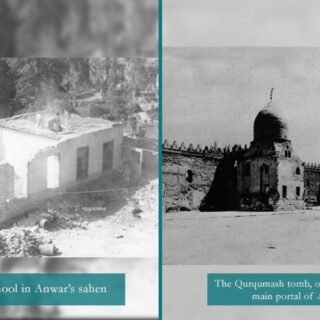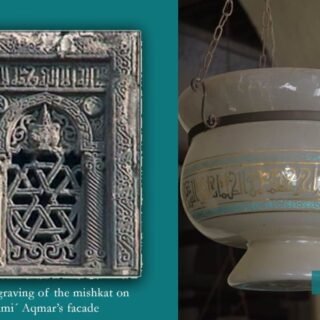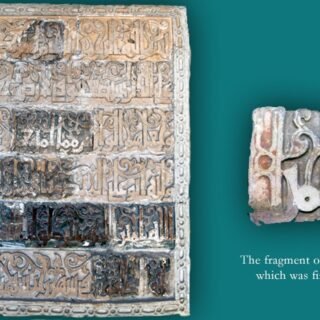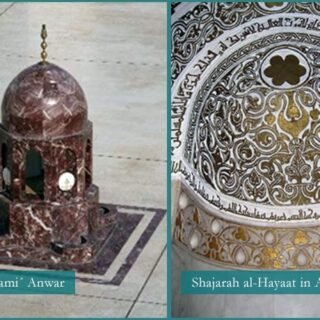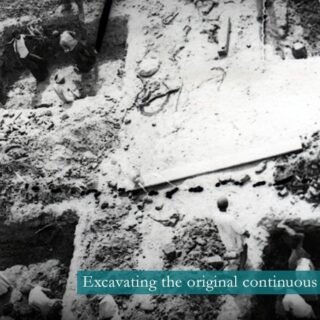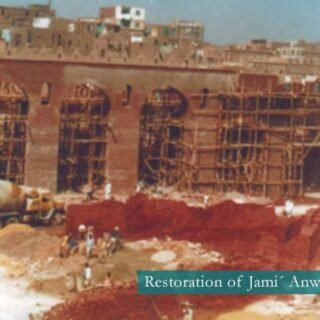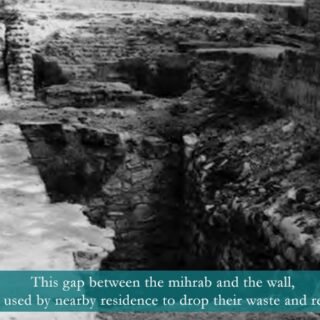The Revelation of the bi’r
The bi’r, well, of al-Anwar was the fourth aayat (auspice) that was revealed during the revival and restoration of the masjid. The discovery came about during the clean-up operation when one of the bulldozers being used to shift the mounds of dirt and rubble struck something solid, causing it to tilt inwards. This object turned out to be a covering of some kind with a massive cavity beneath.
When the cover was removed, water was seen. Al-Dai al-Ajal Syedna Aali Qadr Mufaddal Saifuddin TUS recollected that he was present at the site and that an enthusiastic Egyptian by the name of Mohammedain quickly descended in it, tasted the water – despite it still being murky with silt – and declared ‘It is barakat and shifaa’’. Of those present, someone suggested that a sample of the water be sent to a laboratory to be tested, in order to determine its source and whether it is potable. Syedna al-Dai al-Ajal TUS replied that this water is the barakat of Imam AS and bears shifaa’.
A pump was installed to draw out the water, however, the force of the pumping led to portions of the sahn (courtyard) collapsing which in turn prevented access to the well. Syedna Aali Qadr TUS was adamant that the well be re-dug as soon as possible, and with his hands began removing the blockage. After a depth of ten metres was cleared, it was established beyond doubt that this was indeed a well built by Aimmat Tahereen AS, and its discovery was nothing short of miraculous. Due to the general shortage of water in the locality, the discovery of the bi’r proved invaluable to the construction needs of the masjid.
Syedna Mohammed Burhanuddin RA once stated that the water of this bi’r is delectable. Whenever, Syedna Burhanuddin RA visited Anwar he would drink from this well, and today Syedna al-Dai al-Ajal TUS continues to do so.
Prior to Anwar’s inauguration in 1980, the Minister for Awqaaf came to the masjid in preparation for President Anwar Saadat’s visit. The minister, who was skeptical towards the community, came by the well and questioned as to what was inside it. He had seemingly been misinformed by miscreants that the well was being used to conceal weapons. Amirul Jamea, Syedi Najmuddin QR replied by asking him whether anything other than water comes out from wells in Misr!
Water & Knowledge: Essential to Life
As stated in the Quran Majeed, the water found in wells is the very water that has descended from the skies. It is this water which is vital to the formation of minerals, growth of trees, survival of animals and the sustenance of human life. Such is the importance of water and, likewise, the vitality of knowledge. Keeping both water and knowledge free from all forms of contamination is vital. The means to ensure the pureness of knowledge, is purity of intent: one’s knowledge should lead him and aid him in reaching Allah and the hereafter.
Syedna al-Dai al-Ajal TUS then counseled Mumineen to advance in all fields of knowledge, innovate, think and contemplate. However, they should never lose their sense of purpose in attaining knowledge, otherwise, instead of yielding benefit the knowledge that they have acquired will prove to be detrimental. Purity of purpose is a notion that extends to all matters. If the intent behind the development and use of weapons technology is to find a path towards Allah then they will never be used for purposes of destruction. But the moment Allah is forgotten, these weapons will be used for nefarious purposes, spreading chaos and discord and leading to the ruin of towns and cities. For example, dynamite can be used to make roads in mountainous regions, but it can also be used for the destruction of society.
In Yemen, Syedna Burhanuddin RA constructed a road leading to Hutaib Mubarak from Manaakha. A local resident complained to a government minister that this road was self-serving and only built to ease access to the mausoleum at the end of it. The minister replied ‘If only there were shrines of saints atop all the hills, then they would all have roads’.
Syedna al-Dai al-Ajal TUS guides us that regardless of the field of knowledge or literature, the end goal should always be the remembrance of Allah Ta´ala. If this balance between the temporal and spiritual is maintained, then one’s attainment is meaningful and of value. Imam AS inscribed a design in the mihrab of Jami´ Azhar known as Shajarat al-Hayaat (Tree of Life), a design which Syedna Burhanuddin RA replicated in Jami´ Anwar. A mihrab leads the worshipper towards Allah, similarly the placement of this design in the mihrab indicates that the purpose behind all craftsmanship should be to attain proximity to the Creator.
The Battle of Khandaq
In the narration of Khandaq (Battle of the Trench), Syedna TUS expounded upon the variation in purity of intent. Firstly, one of Prophet Mohammed’s companions conveyed to him that ´Amr b. Abd Wad had stipulated that he would withdraw from battle if Rasulullah SA were to renounce his claims of prophethood. He urged Rasulullah SA to do so claiming ‘what difference does it make’. Rasulullah’s SA rebuke was so severe that it led to that companion taking up his bow and arrow and pointing it at ´Amr. ´Amr glanced back and threatened him with the annihilation of ´Adee (his tribe) if he were to release the arrow. The companion, displaying his lack of faith in Rasulullah SA and composure in warfare, dropped his weapon and fled. Syedna TUS noted that the true test of one’s expertise is when he finds himself in a trying situation.
Like Ohod, where Amirul Mumineen AS refused to leave Rasulullah SA despite everyone else having fled, in Khandaq he too showed the knowledge he had attained. Once again the stark contrast in ideals between Amirul Mumineen AS and his opponent was evident for all. As he rose to face ´Amr, he stated to Rasulullah SA: I am ready to serve you, and will seek aid from Allah in combatting him. These words showed that Amirul Mumineen’s AS knowledge guided him to keep faith in Allah and come to the aid of Rasulullah SA. Amirul Mumineen’s AS nobility was seen when he first confirmed with Amr the truth of the vow he had taken that he would not be given two options but would accept one of them. The first option Amirul Mumineen AS offered was for him to accept Islam. Maulana Ali’s AS first words were to convey to him the message of Allah Ta´ala and call him towards peace. ´Amr refused that offer and accepted instead the invitation to draw swords. At this point, ´Amr’s actions laid bare his misplaced ideals: he committed another atrocity by slicing off the feet of his horse, an old Arab custom, so that in the event of defeat the victor would be unable to mount it. After having sliced ´Amr right down the middle, that same companion of Rasulullah SA came up to Amirul Mumineen AS, kissed his forehead and urged him to take Amr’s armour which was worth four thousand Dirhams. Amirul Mumineen AS replied ‘I will never take away someone’s clothes and leave them bare’. Syedna al-Dai al-Ajal TUS stated ‘It is the way of adversaries to lay bare [shortcomings], whilst the way of Amirul Mumineen AS is to conceal them’.
The Battle of Siffeen
This nobility of thought and deed was further exemplified during the Battle of Siffeen where Maulana Ali AS had downed an enemy and was preparing to strike the final blow. Just then that man spat in Amirul Mumineen’s AS face. The natural reaction would be greater rage but this was Maulana Ali AS. Maulana Ali AS drew his sword back and let the man go. The man asked him the reason behind this sudden turn of events to which he replied that war is only for Allah’s cause. Since the man had spat at him, Amirul Mumineen AS explained that his anger towards the man also became entwined with his intention to fight in Allah’s cause. However, he did not wish to do anything unless it was solely for Allah and hence he let him go. Syedna al-Dai al-Ajal TUS drew our attention to Maulana Ali’s AS ‘presence of mind’ in such a tense and heated moment, the outcome of which was that the man accepted Islam.
The above two examples call to the heart of Awliyaa’ Allah’s AS actions. Whether they rise to battle or forsake it, their ultimate aim is the preservation of Islam and the salvation of its adherents. Maulana Ali AS did not draw his sword when dragged to give an oath of allegiance following the passing of Rasulullah SA since many of those who had come to get him would have the faithful amongst their descendants. In Siffeen, when he did draw his sword, he struck all those he struck knowing them and their descendants, despite the heat of battle. In the same manner, Imam Husain AS was well aware of all those he slayed in Karbala, knowing that there would be no faithful in their future generations.
The Battle with One’s Self
The narration of these battles, reminds us of Rasulullah’s SA observation when returning from the Battle of Tabuk ‘we have returned from a lesser jihad to a greater jihad’. This greater jihad is one in which we battle our whims and fancies and persevere for the betterment of our souls. In all of their battles, Awliyaa’ Allah AS displayed the underpinning values of the greater jihad. Maulana Badr al-Jamaali RA lists twelve conflicts that constitute jihaad akbar (the Greater Jihaad):
- To hold one’s self back from whims and desires
- To bring the soul on to the path of righteousness
- To bring the soul towards the actions of the pious
- Decorate the soul with love for the scholarly
- Make the soul bear the difficulties faced in Allah’s obedience
- Cause the soul to forgive the transgressions of the naïve
- Hold the soul back from transgression when angry
- Inculcate in the soul forbearance in the face of hardships
- Make the soul thankful during times of distress just as it shows gratitude in times of happiness
- Prepare the soul to such an extent that when it has the power to impose punishment it instead chooses to forgive
- To make the soul desist from vanity, pride and eye-service
- To distance the soul from miserliness and depravity
In Shawwal 1437 H, during their meeting in Cairo, Egypt, the Egyptian President General Sisi asked Syedna al-Dai al-Ajal TUS about his views regarding the state of global affairs. Syedna al-Dai al-Ajal TUS replied, ‘If everyone was to engage in jihaad akbar, then all would become well’. The President immediately agreed.
In the battle of the self the tussle is between worldly comfort and desires and religious discipline and piety. This is perhaps not better illustrated than by the well-known narrative of Maulaya Raja QR in Morbi whose occupation was weaving cloth. One day, with the time for Maghrib namaaz imminent, he decided to finish off a portion he was working on. The first time of namaaz passed before he went to the well to draw water. Instead of water, the pail drew silver and gold coins. He cast them back in and drew up the pail again only to find it filled with jewels. Praying for forgiveness for his tardiness in praying namaaz he cast them away too and was finally rewarded with a pail of water. From that day on he never prayed namaaz but at the first time, while his rewards for forsaking worldly chattels, temporal jewels, was that in his descendants he was blessed with the jewels of Aale Mohammed AS: Duat Mutlaqeen RA.
In order to remain safe from haram, one is required to carefully read the ingredients before purchasing food products. Similarly, he should be aware of the education he is receiving, whether it will benefit him in the pursuit of the hereafter, or whether it will divert him from it. Syedna al-Dai al-Ajal TUS directed that the slopes of Yemen be rid of Qat and in place crops that benefit, like coffee be planted. He recited a few verses written by Syedi Hasan b. Idris QR in praise of coffee describing its plantation as a delight to the eye, its beans as rubies and its aroma like musk. In another qaseedah he calls coffee the mother of comfort. Similarly, Syedna Abdulqadir Najmuddin RA wrote verses stating that coffee benefits digestion, as well as inviting Syedi Abdeali Imaduddin QR to have some.
In Karbala, Imam Husain AS ensured that Ahlebayt AS and Ashaab AS engaged in jihaad akbar. Despite three days of thirst and hunger, their words and thoughts were only of praise and gratitude. Just as Mulla Raja QR discarded the jewels, Maulana Aliakber AS disregarded the amnesty offered to him by the opposing forces. Regardless of the adversities he faced, Imam Husain AS did not surrender, and at the time of ´asr asked where Allah’s happiness lies.
The need to ‘return’ from the lesser to the greater jihad, alludes to our fall from grace. At that time, we failed to engage in battle with our soul. Today we have the opportunity to return to this battle with our souls so that we may regain what we have lost. Just as Maulana Aliasger AS cried for being unable to attain shahaadat on the day of Aashuraa’ stopping only when Imam Husain AS lifted him out of his cradle and took him to the battlefield, may our tears on Imam Husain AS flow incessantly until we finally ascend from the cradle of this world and enter the presence of Imam Husain AS.

